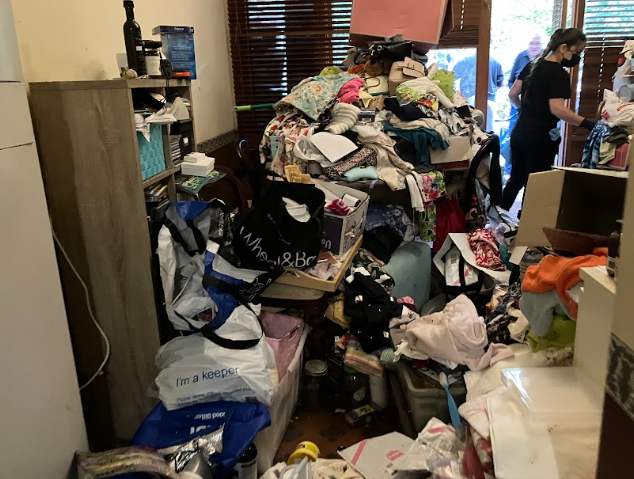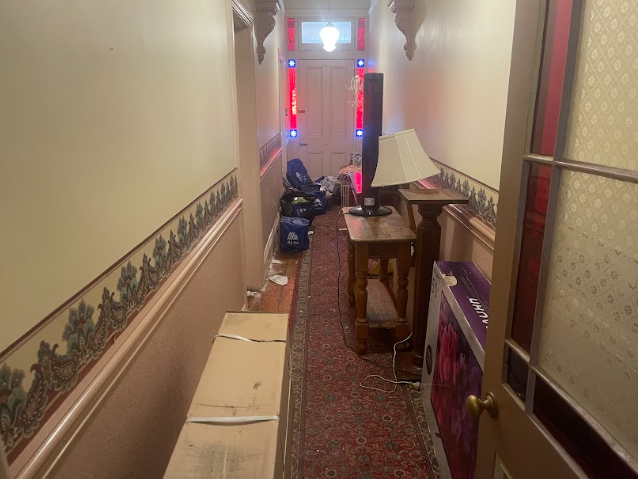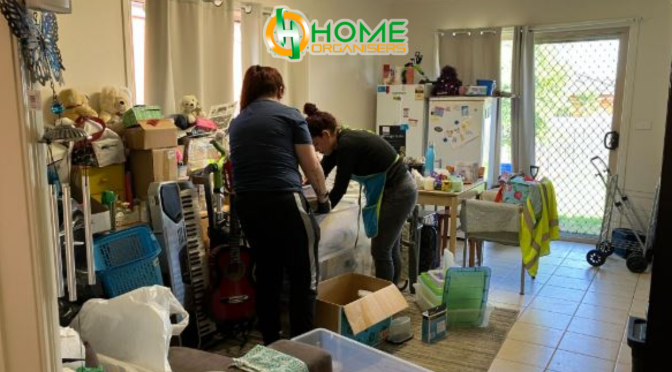Hoarding is more than just having too much stuff. For many people, especially those receiving hoarding NDIS support, hoarding is a serious issue that affects their health, safety, and emotional well-being. It’s not about being messy or lazy — it’s often connected to deep feelings, past trauma, or mental health conditions like anxiety or depression.
When people hear the word “hoarder,” they may picture a room full of boxes or newspapers. But hoarding is not just about clutter. It can make everyday life hard, from getting out of bed to cooking a meal to moving safely through the home. That’s why simply hiring a cleaner is not enough.
Let’s examine why NDIS participants with hoarding behaviours need more than cleaning and how a different kind of support can help them live better, safer lives.
Health and Safety Risks
A house filled with items from floor to ceiling can quickly become unsafe.
- Tripping hazards: Cluttered walkways can lead to falls, especially for older adults or those with mobility issues.
- Fire risks: Piles of paper, boxes, or clothes can become fire hazards, especially if they’re near heaters or stoves.
- Mould and pests: Hoarded items often block airflow and hide food waste or dampness, leading to mould growth and attracting insects or rodents.
- Blocked emergency exits: Blocked doors and windows could escape difficult or impossible if a fire or emergency occurs.
Cleaning may temporarily remove these risks, but if the behaviour behind hoarding isn’t addressed, the danger can quickly return.
Mental and Emotional Health
Hoarding is often linked to mental health conditions. People may feel deeply attached to their items, even if others don’t understand why.
- Fear of losing control: Letting go of items can feel like letting go of memories, people, or a part of themselves.
- Anxiety and guilt: When a cleaner throws things away quickly, it can trigger extreme stress or panic.
- Shame and isolation: Many feel embarrassed about their home, avoiding visitors or help, which leads to loneliness and worsening mental health.
A professional who understands hoarding will move slowly and gently, working with the person at their pace. They focus on building trust first — not just removing objects. This is the foundation of trauma-informed cleaning, which recognises that each item might carry meaning or emotional weight and that clearing a space must be done with care and consent.

Family and Relationships
Hoarding can also create conflict in families.
- Strained relationships: Family members may argue or feel frustrated if a loved one refuses to let go of clutter.
- Carer stress: Support workers and carers can feel overwhelmed or unsure of how to help.
- Children’s safety: In severe cases, cluttered homes may not be safe for children, which can lead to involvement from child protection services.
Support services that specialise in hoarding NDIS support work not only with the person, but also with family and carers. They help everyone understand what’s going on and how to work together, with kindness and respect.
Mood, Productivity, and Daily Living
Cluttered spaces can make simple daily tasks feel impossible.
- Hard to focus: Too much visual mess makes it hard to think clearly or stay calm.
- Lack of motivation: It can feel overwhelming, like there’s no point in starting anything.
- Disorganised routine: Important items like medication, keys, or bills may be lost or buried.
- Sleep problems: Many people with hoarding behaviours also struggle with poor sleep, especially if their bedroom is filled with items.
When a home is cleared in a supportive, step-by-step way, people feel a sense of relief and calm. Their daily lives start to improve—they can cook meals again, sleep better, and feel more in control of their time. This is the power of specialist decluttering, which focuses on tidying up and helping the person build new habits and routines.

Wealth and Financial Impact
Yes, hoarding can even affect a person’s money.
- Purchasing duplicates: Many people buy things they already have but can’t find.
- Wasted storage: Renting extra storage units or buying more containers adds unnecessary costs.
- Repair costs: Piles of items can hide damage, such as leaks, mould, or pest problems, that can become costly to fix later.
- Lost benefits or services: If a home becomes unsafe, it may not meet home care services or housing support standards.
Teaching organisation skills and creating sustainable routines through specialist decluttering can help people save money and better manage their day-to-day living.
Wellbeing and Self-Esteem
One of the most significant impacts of hoarding is the way it affects how someone feels about themselves.
- Loss of dignity: People often stop inviting others over, stop asking for help, and feel hopeless about their situation.
- Feeling judged: Many have been told for years that they are “just messy” or “lazy”, which only adds to their pain.
- Sense of failure: They may try to clean independently, but give up when it gets too hard or emotional.
That’s why working with trained professionals, not just cleaners, can change lives. The right support helps people feel respected and heard. It gives them hope that things can get better, and the confidence to believe they deserve a home they’re proud of.
The Role of Supportive Services
Hoarding behaviour requires specialised help, not a one-time clean-up.
At Home Organisers, we believe in gentle, ongoing support that puts the person first. We don’t rush or throw things away without consent. We build trust, take small steps, and always work with the participant’s hoarding NDIS support plan and care team.
We also work alongside other support providers—such as psychologists, behaviour support practitioners, and support coordinators—to ensure that every part of the plan supports lasting change.
Cleaning is only one part of the puzzle. Long-term success comes from routines, organisation skills, trauma-informed cleaning, and practical tools people can use every day.

In Summary
NDIS participants with hoarding behaviours need more than a cleaner because:
- It’s not just a cleaning issue — it’s often linked to mental health and trauma
- Quick clean-ups can cause emotional harm and worsen behaviours.
- Safety, health, and well-being are all at risk in cluttered environments.
- Real change happens with time, trust, and professional support.
- A holistic approach supports the person, their family, and their future.
- Services like trauma-informed cleaning and specialist decluttering provide respectful, long-term solutions.
What You Can Do:
If you or someone you care for is living with hoarding behaviours:
- Know that help is available
- Choose services that understand hoarding NDIS support — not just general cleaning.
- Focus on building a support team, not placing blame.
- Celebrate small wins — every cleared space is a step forward.
Lasting change takes time, but it’s possible. With the proper support, NDIS participants can return to their homes to places of safety, comfort, and pride.
Need support with hoarding behaviours? Contact our team at Home Organisers today! Call us on 03 8583 9103, email nancy@homeorganisers.com.au, or visit Home Organisers to learn more.


